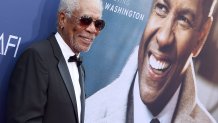

The following content is created in partnership with the National Black Movie Association. It does not reflect the work or opinions of NBC Washington's editorial staff. Click here to learn more about the National Black Movie Association.
Stories are powerful: They move and inspire us, bring us closer to different realities, and can also remind us of what it means to be human. Films are no exception. Watching more diverse films has the power to broaden our views and, at the same time, reminds Hollywood that we want to see different stories onscreen. With a country as diverse as ever before—according to the most recent Hollywood Diversity Report, over 40 percent of the U.S. population are minorities and will become the majority within a couple of decades—the movie industry is still catching up, with people of color underrepresented both in front and behind the cameras.
With that in mind, the National Black Movie Association (sponsor of this article), launched National Black Movie Day, a day to acknowledge, celebrate and support the contribution of Black talent in the film industry. Here, a list of Black film creators whose voices have made films more socially relevant and interesting. Get your popcorn ready!
Directors
Looking at these names all together shows how these creators have helped push movies forward in the industry. Regardless of their varying styles, genres or stories they’re telling, they all share the ability to combine social and political narratives with artful and innovative filmmaking.
Spike Lee
One of the leading voices in American cinema, his influence goes beyond the big screen. Considered by many to be the first Black director to become a household name, thanks to movies like Do the Right Thing and BlacKkKlansman, Spike Lee has been at the helm of Black cinema since the early 90s. From biopics to documentaries, war films to musicals, no two of his films are alike.
Ava DuVernay
Though she started her career in broadcast journalism and didn’t pick up a camera until she was 32, DuVernay continues to push through representation and gender boundaries with her work as a director. Be it through movies—from the historical Selma to her adaptation of the classic A Wrinkle in Time—miniseries or documentaries, her work keeps garnering accolades and sheds a light on the Black experience.
Barry Jenkins
Though his films explore issues of race, culture, addiction and sexuality, they all share a common thread: Black love. Jenkins’ work offers us a different gaze, a new way of seeing stories—love stories—led by Black actors. The use of color and light in Medicine for Melancholy, Moonlight and If Beale Street Could Talk are key elements of his storytelling, bringing us closer to the vulnerability of his characters.

Taking the Lead
Since the early days of cinema in the late 19th century, the on-screen roles for Black actors have made slow progress. For a long time, they often got secondary roles, mostly playing maids or butlers. But throughout cinema’s history, Black actors and actresses have challenged this narrative.
The Pioneers
In the search for better roles for Black actors, two names are impossible to not mention: Sidney Poitier and Cecily Tyson. Poitier’s career —which spanned from acting, writing, and directing— was marked by becoming the first Black actor to win an Academy Award. His depiction of proud and powerful characters is still considered revolutionary today. For her part, Tyson fought for better, stronger and more dignified roles for Black women, by refusing to play drug addicts, prostitutes or maids.
Established Names
Today, when looking at names like Morgan Freeman, Denzel Washington and Samuel L. Jackson one can see how much things have changed. These actors have continuously proved the importance of their roles, being nominated for and winning awards such as Golden Globes and Oscars.
A New Generation
The future of Black actors looks promising, with young actors like Donald Glover, Amandla Stenberg and Zendaya shaking things up. With great success in widely-known films such as The Greatest Showman, The Lion King, and The Hate U Give, they have proven they have what it takes. But there is still a long way to go: According to the most recent Hollywood Diversity Report, two out of every ten lead roles in movies are played by people of color. That’s why it’s so important to watch and share diverse films.

Beyond Fiction
There’s a great selection of incredible documentaries that delve into and celebrate Black stories. Streaming services are offering a wide array of documentaries to help people educate themselves around social issues like racial inequality and systematic racism, and on important and inspiring real-life stories that stem from Black culture. Some you don’t want to miss:
- I Am Not Your Negro: Based on James Baldwin's unfinished manuscript Remember This House—a deep dive to the lives and assassinations of Medgar Evers, Malcolm X, and Martin Luther King, Jr.— filmmaker Raoul Peck forges an end to the book that was supposed to be.
- 13th: With a combination of archival footage and interviews with powerful political figures, this is a must-see for anyone who wants to understand mass incarceration in America.
- Soundtrack for a Revolution: Taking a fresh approach to the story of the American Civil Rights Movement, it features the powerful music from the movement itself.
Celebrate over 100 years of Black contributions to the film industry. National Black Movie Day looks to honor and promote Black achievements in film. Click here to learn more about this celebration and the work the National Black Movie Association is doing.

